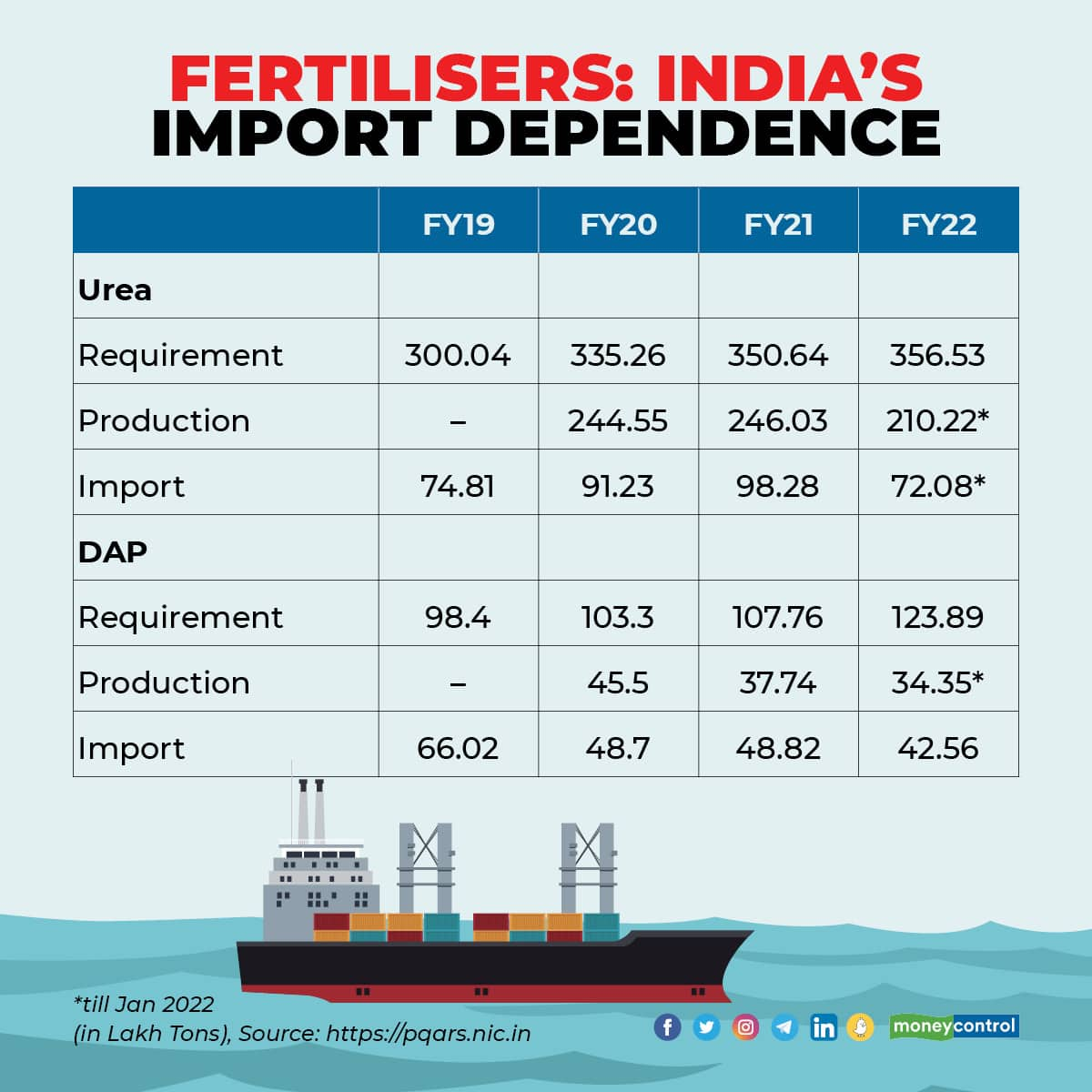



The Russia-Ukraine war has expanded India’s worries about securing even normal supplies of critical fertilisers from Russia and other European countries. India depends heavily on imports for fertilisers – used to boost crop productivity – and experts say a large quantity of the urea India consumes comes from other countries.
With low self-sufficiency, volatility in global fertiliser supplies is bound to have a significant impact on India. India’s fertiliser imports had been rising even before the Russia-Ukraine conflict due to pandemic-related disruptions. Between 2018-19 and 2020-21, India’s fertiliser imports increased almost 8 percent to 20.33 million tonnes from 18.84 million tonnes.
India’s import dependenceIn FY21, more than a fourth of the urea requirement was imported, as per data in a response to question no 656 in the Rajya Sabha on February 8, 2022.

In the case of Di Ammonium Phosphate, close to half the quantity needed was shipped in from overseas. Even then, there was a shortfall between the quantity available and the requirements.
Has India improved domestic production of fertilisers?There was a mixed trend in local fertiliser production in FY21, according to data from the Fertiliser Association of India. Urea production was little changed, while DAP output fell by over 17 percent and output of nitrogen fertilisers increased by about 8 percent.
Urea: 24.6 million MT (+0.6%); DAP: 3.77 million MT (-17.1%); SSP: 4.92 million MT (+15.8%); NP/NPKs: 9.33 million MT (+7.6%).
The FAI data show that imports remained high in FY21. Urea imports increased to 9.83 million MT (+7.7 percent); DAP imports were at 4.88 million MT (+0.2 percent). The big spurt was in imports of nitrogen fertilisers as NP/NPK shipments were at 1.39 million MT (+86.3 percent). Muriate of potassium (MOP) saw a jump in imports to 4.23 million MT (+15.2 percent).
India has expanded agricultural output every year and the consequent need for fertilisers has also risen. Indigenous production targets are not always met and even after imports, gaps remain between the requirements and availability.
According to FAI, growth in fertiliser consumption was robust in FY21. Urea use rose 4.5 percent to 35.04 million MT; DAP climbed 18 percent to 11.91 million MT; MOP need increased by 19.5 percent to 3.42 million MT, while growth in the use of nitrogen fertilisers was 22 percent at 11.81 million MT.
Thirteen states accounted for 92 percent of fertiliser consumption.
Uttar Pradesh had the largest share (17.3 percent), followed by Maharashtra (10.5 percent), Madhya Pradesh (8.9 percent), Karnataka (6.8 percent), Andhra Pradesh (6.2 percent), Gujarat (6 percent), Punjab and Bihar (5.9 percent each), Telangana (5.6 percent), Rajasthan (5.5 percent), West Bengal (5.3 percent), Haryana (4.5 percent) and Tamil Nadu (3.4 percent).
Demand for urea and nitrogen fertilisers has gone up in five years, whereas it’s been a mixed trend for others, according to a written reply in the Rajya Sabha to question no 1,785 on December 14, 2021.
Alongside, the combined domestic production targets of private and state-owned fertiliser production units have remained unmet in some years. (Annexure I in the reply)
Is the government working to make India self-dependent in some fertilisers?Rock phosphate is the key raw material for DAP and NPK fertilisers and India is 90 percent dependent on imports for them. Volatility in international prices affects domestic prices of fertilisers and hinders the progress and development of the agriculture sector in the country.
The Department of Fertilisers has prepared a plan to make India Aatmanirbhar (self-reliant) in rock phosphate. The government is working towards commercially exploiting and ramping up production in 3 million MT of phosphorite deposits available in Rajasthan, the central part of peninsular India, Hirapur (Madhya Pradesh), Lalitpur (Uttar Pradesh), the Mussoorie syncline, and Cuddapah basin (Andhra Pradesh).
For urea, the government has decided to revive defunct manufacturing plants and a number of them are expected to get commissioned in this calendar year.
What is fertiliser subsidy?The government pays a subsidy to fertiliser producers to make this critical ingredient in agriculture affordable to farmers. This allows farmers to buy fertilisers at below-market rates. The difference between the cost of production/import of a fertiliser and the actual amount paid by farmers is the subsidy portion borne by the government.
The government allocated a subsidy of Rs 63,222.32 crore for urea fertilisers and Rs 42,000 crore for nutrient-based fertilisers in FY23, compared with Rs 75,930.32 crore and Rs 64,192 crore, respectively, in FY22.
Discover the latest Business News, Sensex, and Nifty updates. Obtain Personal Finance insights, tax queries, and expert opinions on Moneycontrol or download the Moneycontrol App to stay updated!
Find the best of Al News in one place, specially curated for you every weekend.
Stay on top of the latest tech trends and biggest startup news.